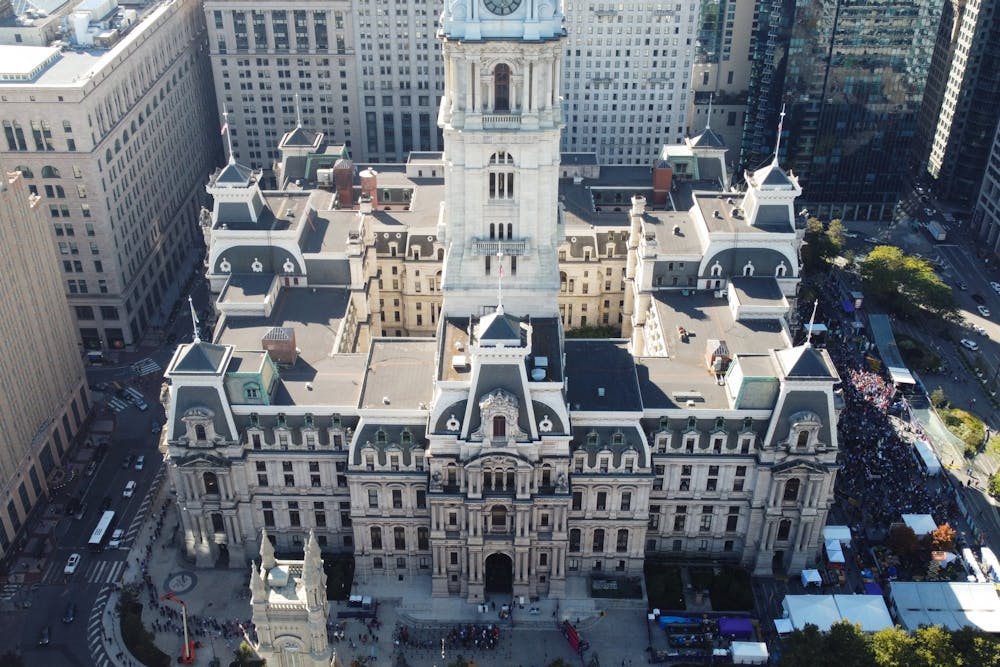
Philadelphia City Hall in Center City on Oct. 15, 2022.
Credit: Abhiram JuvvadiThis May, hundreds of thousands of Philadelphians will flock to the polls to cast their ballots in the Democratic and Republican primary elections to select each party’s nominee for the city’s 100th mayor, and then again in November during the general election.
So why should Penn students be paying attention this early? The reason is because registered Democrats outnumber registered Republicans in Philly by seven to one, so barring any major surprises, the winner of this May’s Democratic primary will likely be the winner of this November’s general election.
What’s more, the person we elect as this city’s mayor will arguably affect our everyday lives as students and Philly residents. The University of Pennsylvania and its Health System (UPHS), which includes Penn Medicine, constitutes one of the largest employers in the city, and so local politics can have a massive impact on these organizations. For example, there are numerous progressive candidates running for mayor that have secured the endorsement of powerful labor unions in the city.
These include Cherelle Parker, who has received an endorsement from the Philadelphia Building and Construction Trades Council; Jeff Brown, who has gained support from the American Federation of State, County and Municipal Employees District Council 33; and Helen Gym, who was endorsed by the Philadelphia Federation of Teachers. The involvement of key labor unions in the mayor’s race is especially important in the context of the ongoing efforts by RAs and GAs at Penn to unionize for increased labor rights and fair compensation.
Penn infamously does not pay property taxes to the City of Philadelphia because its tax-exempt status is derived from its existence as a nonprofit entity. The University also refuses to make payments in lieu of taxes (PILOTs), a decision that forces surrounding areas such as increasingly gentrified West Philadelphia to pay for the extra tax revenue that is not supplied by Penn. Current mayor Jim Kenney, as an example, was not willing to negotiate with institutions like Penn, Drexel, and others throughout the city to enact PILOTs programs, but this could change moving forward.
Furthermore, the new mayor’s policies will have an impact on cost of living concerns in a city where housing and utilities are becoming more expensive, directly affecting Penn students who live off-campus. Public safety has also become an increased issue, with the budget for city-sponsored violence prevention initiatives having increased alongside overall gun violence. However, since Philadelphia is heavily restricted by Pennsylvania law and a statewide judicial system that blocks the city’s ability to enact meaningful gun control policies at every turn, it is worth exploring the different candidates’ platforms and perspectives on enhancing public safety.
This election could also be a historic one, given the diverse slate of candidates. For example, four of the 10 major candidates are women, which is a step in the right direction for a city that has never elected a woman to the mayoral office despite having had 99 mayors in its long history. Furthermore, the presumptive Republican nominee, David Oh, was the first Asian American elected to the Philadelphia City Council. His potential ascension to the mayor’s office would continue the trend set by trailblazers like Michelle Wu, the first woman and Asian American to serve as mayor of Boston, and Aftab Pureval, the first Asian American to serve as mayor of Cincinnati.
I would therefore encourage you to consider changing your voter registration to Pennsylvania, if you haven’t done so already. And if for some reason you cannot or are unable to, that is totally okay — anyone can get involved in civic engagement, despite their circumstances. Whether it involves discussing the mayoral election with friends, watching debates, or participating in politics- and government-aligned student groups on campus, there are myriad ways to get involved in the city’s vibrant political atmosphere.
Even if most of us only live in Philadelphia temporarily, the dynamics of city politics does have an impact on our everyday lives. So if you’re a registered Democrat or Republican, I urge you to either apply for a mail-in or absentee ballot or vote in-person for Philadelphia’s closed primary election on Tuesday, May 16. And if you don’t belong to either one of these parties, you can still vote on the four questions that will appear on local ballots for all voters.

KESHAV RAMESH is a Wharton and College sophomore studying finance, statistics, and international studies in the Huntsman Program from South Windsor, CT. His email address is keshmesh@wharton.upenn.edu.
The Daily Pennsylvanian is an independent, student-run newspaper. Please consider making a donation to support the coverage that shapes the University. Your generosity ensures a future of strong journalism at Penn.
Donate






